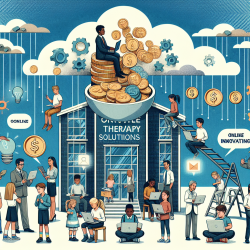The COVID-19 pandemic has forced many psychotherapists to transition from face-to-face (f2f) therapy to video therapy (VT). Concerns about this switch's impact on the therapeutic alliance, coping skills, and emotional involvement have been widespread. However, a recent study titled The Effects of Switching to Video Therapy on In-Session Processes in Psychotherapy During the COVID-19 Pandemic provides valuable insights that can help practitioners navigate this new landscape.
Key Findings
The study, conducted by Edelbluth, Schwartz, and Lutz, evaluated 454 patients with mood or anxiety disorders. The researchers compared two groups: one that switched from f2f to VT (intervention group, IG) and another that continued with f2f therapy (control group, CG). Here are the main outcomes:
- Therapeutic Alliance: The therapeutic alliance significantly increased after switching to VT, with patients rating the alliance higher than therapists.
- Coping Skills: Coping skills also increased post-switch, although the CG rated these skills higher than the IG. Therapists generally rated coping skills higher than patients.
- Emotional Involvement: There was no significant change in emotional involvement across both groups and raters.
Implications for Practitioners
The study's findings suggest that switching to VT does not negatively impact the therapeutic alliance or emotional involvement. Here are some actionable steps for practitioners:
- Maintain Strong Communication: Since patients rated the therapeutic alliance higher than therapists, it's crucial to maintain open lines of communication to understand patients' perceptions better.
- Focus on Coping Skills: Given the increase in coping skills post-switch, therapists should continue to emphasize this aspect, especially for patients who may struggle more in a VT setting.
- Monitor Emotional Involvement: While emotional involvement did not significantly change, it’s essential to keep an eye on this variable, particularly for patients highly affected by the pandemic.
Encouraging Further Research
While this study provides valuable insights, more research is needed to understand the long-term effects of VT on therapy outcomes. Practitioners are encouraged to participate in and contribute to ongoing research efforts to refine and improve VT methodologies.
To read the original research paper, please follow this link: The Effects of Switching to Video Therapy on In-Session Processes in Psychotherapy During the COVID-19 Pandemic.










